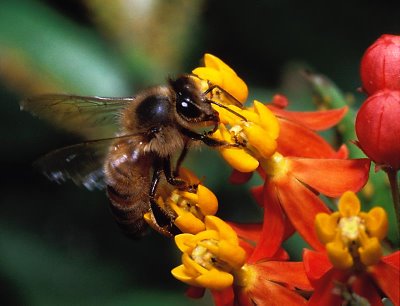
As they buzz from blossom to blossom, it might seem that bumblebees need to see only flowers, honey, and hive. But a new study suggests that bumblebees have a surprisingly sophisticated visual system. Through a series of clever experiments, University College London researchers R. Beau Lotto and Martina Wicklein discovered that bees can solve complex color puzzles. The scientists say the finding may provide new understanding of human vision and guide the development of similar systems for robots. The study appears this week in the Proceedings of the National Academy of Sciences' Online Early Edition. In bees, as with people, vision has as much to do with the brain as it does with the eye. As Lotto explains, the eye sees by detecting light that falls upon its retina.
But, the neuroscientist adds, light that's reflected onto the eye from an object, such as a flower, is constantly changing. To perceive the flower or anything else, the brain must decipher that light. "If you can understand how something relatively simple like the bee solves these problems, then we can apply that to robotics," Lotto said. Developing a visual system that deciphers information, he added, "is the most significant obstacle facing robotics."
But, the neuroscientist adds, light that's reflected onto the eye from an object, such as a flower, is constantly changing. To perceive the flower or anything else, the brain must decipher that light. "If you can understand how something relatively simple like the bee solves these problems, then we can apply that to robotics," Lotto said. Developing a visual system that deciphers information, he added, "is the most significant obstacle facing robotics."


In the honeybee, four of the visual cells in each ommatidium respond best to yellow-green light (530 nm); two respond maximally to blue light (430 nm); and the remaining two respond best to ultraviolet light (340 nm), allowing the honeybee to distinguish colors (except red).
No comments:
Post a Comment